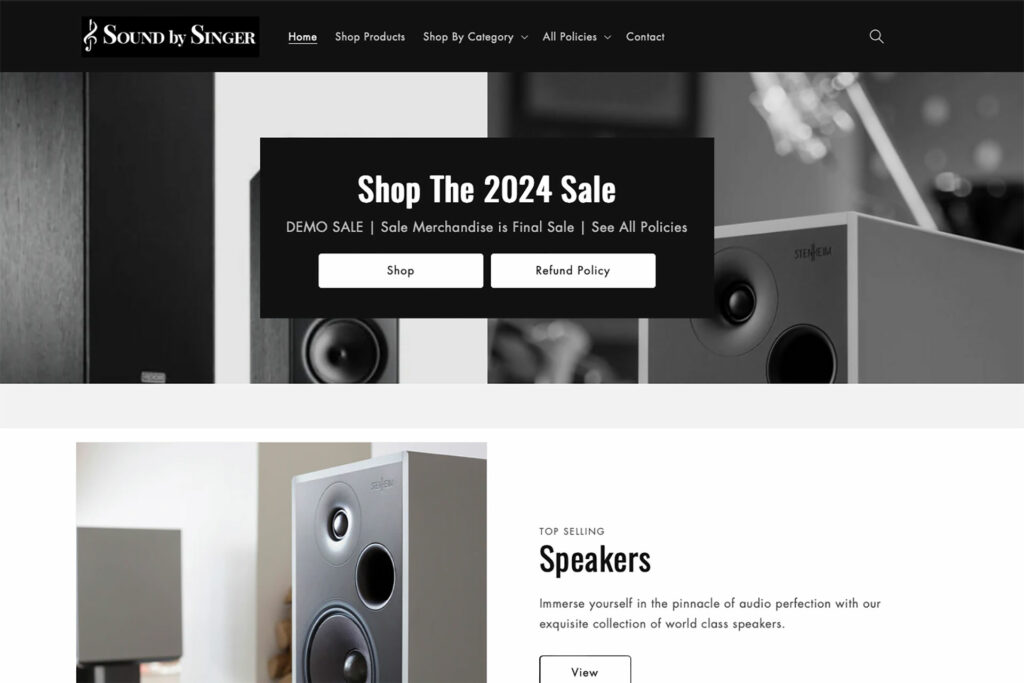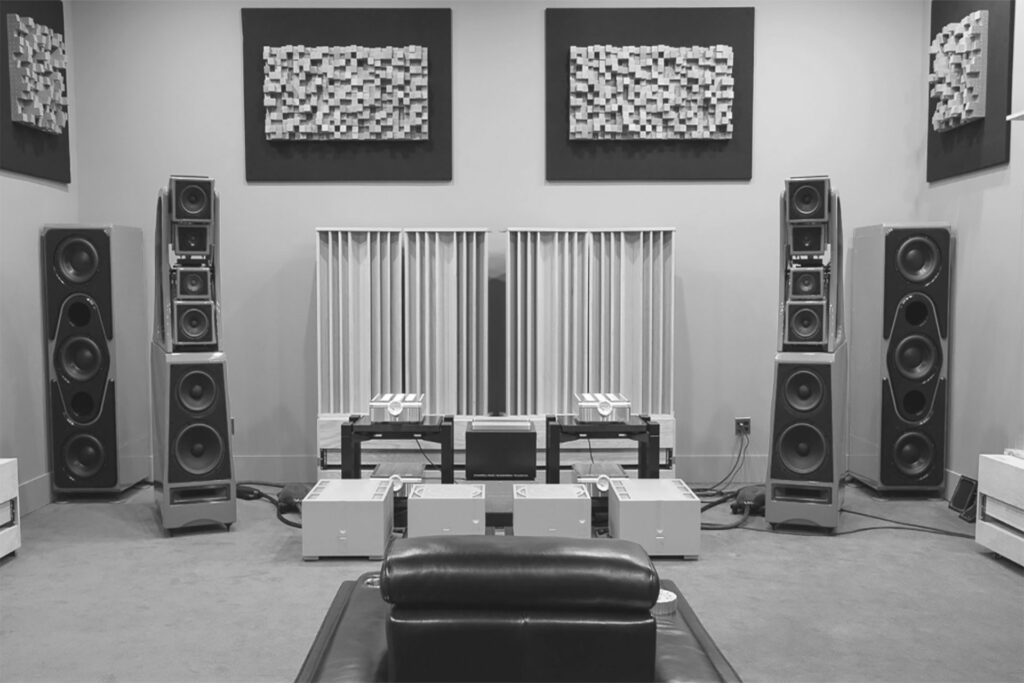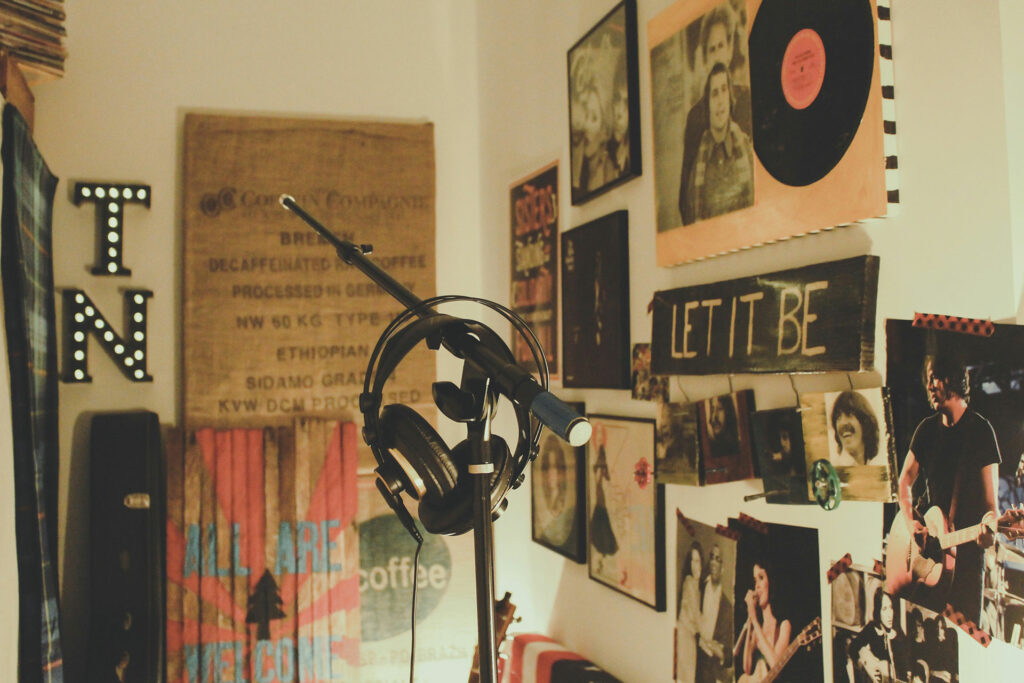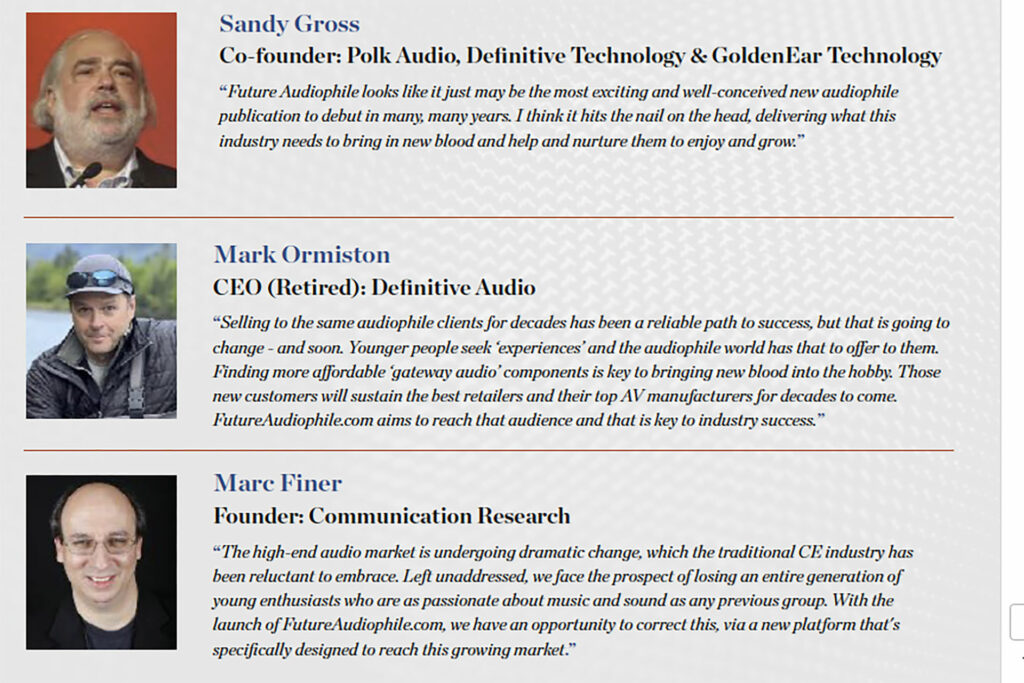There are a lot of colorful personalities in the audiophile business. When I was exiled from audiophile publishing between the end of 2019 and 2022 because of the non-compete that I signed after the sale of HomeTheaterReview.com and AudiophileReview.com, I learned how much I missed the people of the audiophile community, as opposed to my high-paying but non-enriching Fortune 500 sales gig. Manhattan audiophile retailer Andy Singer was one of the most technicolor of those personalities, and an often-polarizing industry friend of mine. For decades, Andy Singer successfully sold some of the the biggest-ticket AV gear from Wilson Audio speakers to Krell electronics, as well as more than 100 other lofty audiophile brands over the years. Of the biggest stores in the United States when I started in the business, there were places like Lyric HIFI (Manhattan), SoundEx (Philadelphia suburbs), Sound Components (Coral Gables, Florida), Christopher Hansen Ltd. (Beverly Hills) where I worked (Beverly Hills), and Sound by Singer (Manhattan again). Andy ruffled audiophile feathers by selling products to clients in Europe, but he also moved the needle in ways that couldn’t be denied, as Sound by Singer was a powerhouse audiophile retailer for decades and decades.
A few weeks ago, Andy Singer died from pancreatic cancer, which is a brutal disease, as I learned sadly with a family friend recently. Andy’s wife is reportedly working with some well-intentioned AV industry people to sell off the demo equipment and remaining inventory from his legendary New York City store. Their website boasts 50 percent off opportunities that will be something that consumers will have to take a serious look at, in that this is at cost or even below dealer cost for open-box, store demo items.

Who Will Take Over for Andy Singer in the Manhattan Audiophile Retail Scene?
One of my clients, a long-time industry buddy, called me this past Monday about a pending ad deal (actually two small ones) that we are working on right now. He was on an Amtrak train from Boston to New York City to find a new dealer for one of Andy’s best speaker lines, Stenheim. I just reviewed a pair of their Swiss-made Stenheim Alumine Two.Five floorstanding speakers, and they are pretty incredible products. They are the least boxy-sounding traditional form factor speakers that I can think of or have heard in the modern era. They are also quite expensive speakers, costing $23,500 per pair, thus having distribution in New York City is simply a must for the brand to be as financially successful as they can be. The greater New York City area is without question the biggest and most important audiophile market in the nation, and one of the most important in the world.
A year or two before Andy died, we had a pretty open conversation about the realities of audiophile retail in Manhattan. The cost of retail space on the island is hard to justify, which is why some dealers are opening in locations like Brooklyn. Others are forced to do more “appointment only” locations that are on higher-floor retail locations. Simply put, even the volume of high-margin, high-dollar sales that an audiophile dealer can do in Manhattan just isn’t always enough to justify the real estate cost that lead any retailer’s overhead expenses. That’s exactly why Andy, after renegotiating in good faith with his landlord at his original ground floor retail store, had to move. Overhead had to be slashed simply to survive. The question is now: who will fill Andy’s place in the market?
It is possible that nobody takes over for Andy, and that his death marks attrition in the New York City audiophile marketplace. When Christopher Hansen Ltd. went out of business, I went to work for Mark Levinson and Joe Cali at Cello Music and Film Los Angeles. We picked up some legacy Chris Hansen clients but, for more than a decade, there was no real replacement for Hansen’s Beverly Hills store anywhere in West Los Angeles. LA Audio Video was in Koreatown, and served that market, but there were no meaningful players in the space as there are today, such as Maier Shadi’s The Audio Salon in Santa Monica or Sunil Mechant’s Sunny Components about 30 miles east of downtown Los Angeles. Those are newer players that define the high-end Los Angeles audiophile market these days. Sound Components near Miami today has been reinvented into more a hybrid audiophile and custom installation business under former owner Mark Goldman, and current owner (Mark’s longtime partner) Bill Peters. They’ve evolved from a large, physical retailer to something much more luxury lifestyle, but without losing their audiophile ties and cred. SoundEx located just outside my hometown of Philadelphia made the classic audiophile mistake of spending to build a “build it and they will come” location with 26 insanely good audiophile rooms. Christopher Hansen did the same in the old Rolls Royce building, with Indonesian investor money, in an incredible physical space on Olympic Boulevard in Beverly Hills. Both went quickly out of business. As Andy taught me, overhead is the biggest killer in the big-time audiophile retail game. Lyric HIFI, another lauded NYC audiophile dealer, is long gone also, as they were one of the biggest dealers for products like Mark Levinson. In fact, Lyric’s owner was one of the early investors with Mark back in the 1990s. When Lyric closed, the other stores just ate up the lines and serviced the legacy clients in Manhattan. It is not impossible for new dealers to creatively make waves in the modern audiophile retail space, but in a hobby still run by Baby Boomers today, there is a distinct hatred for industry change. Guess what, change is coming in ways that these folks aren’t preparing for, and their lack of preparation is potentially going to deeply damage the hobby, as well as business of audiophilia.

Fear of Change is Nothing Compared to Fear of Aging Out …
Nobody wants to talk about their ultimate demise, but it is going to happen to each and every one of us. I recently wrote about the concept of preparing for what your audiophile legacy (read the article here) would be. That could range from taking some kids to an audio store, to donating your music collection to a local music department at a school, to putting your name on a university program, as Ray Kimber has done. Any one act is really helpful to the future of the hobby.
Demographically and according to Time Magazine, men in the United States live to about 73 years old, and women a little longer, to about 79. Men also lose their hearing naturally as we age, which adds to the demographic complexities for the hobby. How much longer will the original audiophiles run the business and define the hobby? Not to be rude, but the science suggests that this timeline won’t realistically extend for much longer. Do the Boomers want to hear these morbid facts? No (nobody does), because the hobby is about fun, and talking about all of us being planted six-feet-under isn’t very much fun. Additionally, the audiophile hobby is well-entrenched into “the way things were” versus the way things will be. When I was working with my team of advisors (Mark Ormiston from Definitive Audio, Marc Finer – the guy who helped Sony launch the Compact Disc in 1983 when I was nine – and Sandy Gross, the speaker empresario who co-founded Polk, Definitive Technology and GoldenEar) in the planning stages of this publication, we chose the name “Future Audiophile” carefully. If we as a group do not embrace the future of where this hobby is going, there might not be a very bright future.

What’s the Upside of the Future of Audiophilia?
Simply put, we need more people into high-performance audio. Men and women. GenX, Millennials, GenX, and soon, Gen Alpha. Everybody. Every pronoun. Every species. I offered to hire a local Chicago artist for AXPONA to give free “audiophile inclusion” tattoos at a recent AXPONA, but for some reason, they weren’t interested!
The one lesson that I have learned in this FutureAudiophile.com project, with nearly 18 months of articles now live, is that I can tell you that it is NOT EASY to find large volumes of younger audiophiles. It isn’t impossible, but they are rare in comparison to finding life-long audiophiles who are in their late 50s, 60s, and often well into their 70s. We invest a lot of time and money to create content written by people who are relatable and of their demographic. We spend a good sum of money every month on age-specific outreach. Our SEO efforts for the publication are unlike those any audiophile publication has ever previously attempted. Our social media efforts are growing with younger audiophiles at a pace that no other audiophile publication or manufacturer can keep up with. We are trying, and we are far from done. We want to do special events. More outreach. We want to hire female audiophiles to write (this has been a specifically hard challenge, unfortunately) and more. Stay tuned, I am not done with these challenges by any means.

Why Should Anybody Be Upbeat About the Future of the Audiophile Hobby?
- Younger people have grown up with unlimited access to music, and they love music even more than those who came before them. I’ll never forget sitting at my desk in my first office ever in a skyscraper in Century City when Edelman PR sent me a box with an item inside of it that I could keep if my publisher would allow it (he is a real asshole, but he let me keep this one), and it was an Apple iPod literally two weeks before it came out. My mind was fully and irrecoverably blown. AVRev.com, my publication at the time, made it the Product of the Year, when the audiophile magazines talked more and more about vinyl and tubes. Kids today know a ton about music. It is an everyday part of their life, but do they know why they might want something more than ear buds for sound playback?
- Today’s audiophile shows do no outreach to younger people and highlight little to no gear that they can afford. $20,000 preamps and $100,000 audiophile speakers are for one-tenth of one percenters. That’s not many people in terms of national demographics, but these are the components that you will see displayed 95 percent of the time at the growing number of regional audio shows. Are the audiophile show promoters working with local colleges or youth groups to drive new people to the hobby? Not that we can see. Are they working with local media outlets to find new luxury goods clients to attend audiophile shows? That’s a negative, also. Instead, they are counting on selling tickets to the same people every year, with little regard for the radically changing demographics of the hobby. Andy Singer’s death should be a needed wake-up call for the hobby/business. He isn’t the first well-known audiophile name to die, and by no means will he be the last.
- The reasons to buy audio gear for younger people are very different than traditional OG (original gangster) audiophiles. Much has been made about the Millennials being “entitled,” and their generation sure do have their quirks (like my GenX doesn’t, as we are all workaholics for one), but Generation X is defined by social anxiety, fear, and the physical manifestations of those concerns. The good news is that listening to audio can reduce fear and anxiety. 15 minutes of listening to some Coltrane can lower one’s blood pressure by 10 blips. You can test this yourself with a $30 blood pressure cuff at home if you are ever so inspired. When I was a young man selling very high-end audio, I didn’t really push the luxury goods angle as much as I did the health/lifestyle angle, and it worked fantastically. Back then, $12,900 for a pair of Wilson WATT Puppy speakers was considered a whole lot of money for some audiophile transducers. Why were they worth the money? Because they could (often paired with a nice glass of wine or a smoky single malt scotch) take the edge off a long day in the real world and give you an “experience machine” to go to another place, thanks to music. I sold a lot of Wilson speakers on that concept.
- Millennials, a huge demographic, tend to value “experiences” more highly than others that came before them. One of the key questions in our early FutureAudiophile.com media kit was, “If we gave you $5,000 for audio gear OR $5,000 to attend a weekend at the Coachella Music Festival outside of Palm Springs – which one would you choose?” At a certain point (think: like 30 to 31-ish), this question gets really complicated. The value that a younger Millennial puts on images of Fits and the Tantrums or some wannabe Kardashian-ass on one’s Instagram account can actually be really compelling to younger potential audiophiles. Experiences are highly valued by this demographic – much more so than us older GenXers and Boomers. Older audiophiles will take the asset option over the experience option 100 out of 100 times, but that’s not the real issue. The issue is explaining to a younger, music-loving, tech-savvy potential audiophile that their audiophile system (or even a great pair of headphones) is actually an “experience machine” capable of taking you to see Jimi Hendrix in Maui in 1968 or into the studio with The Beatles or to hear Beyoncé in ways that you can’t get from a car audio system or some AirPods. As a group, we need to make this argument better and more clearly to younger audiences. The best pitch people for the value of an audio system in one’s life are fellow younger audiophiles. Right now, we need to plant many seeds and nurture them carefully until they start to grow on their own. Make no mistake, we are in the early stages of a very big project, right now.

Final Thoughts on the Legacy of Andy Singer and How It Impacts the Future of the Audiophile Hobby …
Andy Singer could be a very polarizing figure in the hobby. He was famous for purposefully ignoring “finance bros” from investment banks like Goldman Sachs who came in and wanted to blow some of their newly-found Wall Street money. Andy would do the Pretty Woman shopping on Rodeo Drive-level “takeaway close,” which hilariously infuriated these people. Human nature makes us want what we can’t have, thus, in an odd way, Andy’s acts had an unexpected positive effect, even if he pissed some people off in the process. He was like the Soup Nazi, but for audiophiles. “No Steely Dan for you!”
More and more audiophile retail giants and legacies are stepping aside. The same will happen with the cult of personality names in audiophile manufacturing in the coming years. The question is … are we as a community/hobby/business doing enough to reach new consumers? Do we speak the language of the next generation? Are we speaking in their voice? Do we understand their concerns and objections? We need to take some time to consider these challenges, as they are key to the future success of the hobby.
I’ve dedicated the third chapter of my AV publishing career to solving this drastic industry problem. I humbly submit to you that the challenge that we discuss is not an easy one. The establishment audiophiles are still stuck in the past. Old formats. Old technology. Shitty value propositions from exotica and esoterica when it comes to gear. We need to do better. I am all-in. Will you join me in trying to pass on the joy of the hobby to the next generation? I promise it isn’t hard, expensive or all that time-consuming, but it can be really fun and quite rewarding.
How can you help a younger person find the audiophile hobby that has been so rewarding to all of us? Even a small act is very meaningful. What would you be comfortable doing? Share some of your ideas below in the comments. We would love to hear from you.




I have a lot of thoughts on your excellent article . I knew Andy for more then 50 years – – way back to when he was selling equipment from his mother’s apartment . I purchased hundreds of thousands of dollars of equipment from Andy – – Martin Logan Statements , 2 pair of Krell LAT I speakers and more Krell equipment than I can remember . My credentials as an audiophile are strong . But that is not the point of this response . I own or partner in movie theaters in New Orleans that will soon exceed our pre-Covid annual admissions – – a bit over 1/2 million admissions a year , most of them being tourists . I have offered to a number of high end companies the opportunity to show promotional videos in my theaters for free . Only one has taken advantage of my offer which , after about a month of showings , I pulled because it did little to promote the brand ,i.e. , the sound quality of the video was “anemic ” as it proceeded the Dolby Atmos demo that immediately followed it . I talked or wrote to many companies about participating in the creation of an ” Audio Experience Center ” similar to one that shaped my audiophile aspirations as a young teenager in Manhattan . I had an opportunity then and I have an opportunity now to place demo equipment in a mall location with annual traffic of more than 2 million people . Sure , you have more convinced and committed people attending audio shows but I thought the objective was to recruit new audiophiles . You have more than a half million , music-oriented people attending just three of New Orleans’ festivals – – JazzFest , French Quarter Fest and the Essence Festival . I can pretty much guarantee that most – – , yes , most – – will pass through my mall location . I am not a dealer and I am not going to buy demo products but a high end manufacturer would have the opportunity to demonstrate their equipment to a large target audience that never would think of attending Axpona and the like . My recommendation would be to show both your best , to intrigue them , and your least expensive to sell them . Obviously this needs to be monetized since I need to pay the mall , have trained staff to demo the equipment , etc. I believe all of this can be handled through a local dealer with whom I am affiliated . Yes , this is a very different model than the industry is currently using and some existing dealers will hate it – – ” why pay for demo equipment that the mall location is showing for free ?” Good question but I think my answer – – Lyric Hi-Fi , Sound by Singer and the other ” dead ” high end dealers – – is better . To me , this is a ” help me , help you ‘ situation that is at least worth a try .
What a GREAT COMMENT.
I don’t want to write “Dead Baby Boomer” stories all of the time but this one had a lot of other themes that I felt was worth mentioning.
Before I started my store, I went to visit Andy. He was warm, kind, and welcoming to Theresa and me. He suggested not wasting money on building up the store. He told me to invest in inventory. Smart man. Several significant points, observations, and generic limits exist on what customers purchase. In the last ten years, there has been considerable growth in tech companies that constantly hire young people who sometimes get between 100,000 to 250,000.00 signing bonuses. There are literally over 100,000 of these under 35. These young kids had parents who raised them right, guiding them to get careers that pay decent wages and make a comfortable living. They purchase high-performance audio.
Our store welcomes all customers. Some order custom products in bespoke finishes, some only buy store Demos, and others like to purchase our trade-in goods. They are all equally important to us.
Audio is passionate, raw, and Emotionally Real. It does not hide. It evokes emotion, a desire to dance, share joy, and bring us together. Just like watches, some like a Patek or a Richard Mille; it’s just preferences. I have a customer with over 20 Richard Milles. He works hard, is a self-made man, flies his own jet, and loves life. He does have a great system. He will never change. He’s super happy. He truly listens to music—my favorite kind of customer.
So as I see things, there are 3 industries involved in the audiophile world.
We have the recording industry that provide us with the source material. We have the equipment manufacturing industry who makes the equipment we play the music on. Finally we have the retail industry that sells us both the source material as well as the equipment to play it on.
All three of these industries are contradictory to our hobby.
The recording industry is treats their artists horribly, keeping so much of the profits for themselves. The industry also has a love/hate relationship with music consumers. During the 90’s, they treated all consumers as thieves. Instead of coming up with ways to provide mobile music offerings, they sued persons who shared music. Additionally, have you seen the prices of new vinyl? It’s ridiculous! How are young people supposed to build a collection at those prices?
Then we have the equipment manufacturers. Do they all think we can afford $1000.00 speakers? Let’s build up quality equipment at prices people can afford. Once we’re hooked, we will trade up to higher end equipment.
Lastly, the retailers. Record stores are closing at record paces. Equipment retailers treat customers rudely. Unless you’re there to drop big bucks, they would rather that you don’t come in at all.
This is just how I see the music industries as failing us.
The price of vinyl is so outrageous that I really see the bottom falling out once the Boomers are dead. As a Gen Xer, I buy tons of vinyl at the expense of my future. Pricing needs to come down now or it will completely scare off younger generations. Stereophile and TAS must change their pricing focuses so that 1/2 of the magazine is spent to Gen X and Alpha. And yes, OG audiophile brick and mortar stores are lost on selling to new gen people. Putting gear in new environments outside of the normal outlets will be key. Right now, it will die.
That’s a great perspective and one of the main reasons I created ABX-Audiophiles. We approach from a slightly different angle, but nonetheless, we have the same goal—to get youth into audio. Our approach is to support youth musical programs focusing on mentorship through musical creation. The thought is – if our youth do not create the music, we will have nothing. Cheers, and thank you for your mission and efforts.
GREAT to meet you in Seattle!
If you’re looking for female writing talent, ask Melinda Murphy who runs a YouTube channel under her name which focuses on her records and audio equipment. She’d probably be down for it. Or Jana from Darko’s channel.